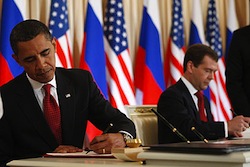New START to Lay Groundwork for Deeper Reductions
March 3, 2010
Featured Image
We are happy to serve you a daily summary of the day's top nuclear policy stories each morning, with excerpts from the stories in bullet form.
Stories we're following today:
US Official: START Replacement Agreement Possible by April - CNN [link]
- U.S. and Russian teams negotiating a new arms control agreement to replace the 1991 START treaty hope to wrap up a deal by early April.
- The biggest issue to resolve is verification, including on-site inspection of missiles that carry nuclear warheads, this official said, adding, "There are still some niggling technical details."
- Negotiators worked out "innovative" ways of verifying each side's arsenal, the official said. When negotiations began in April 2009, Russia wanted a "minimalist" approach to verification and the United States wanted a "solid, effective regime," the official said.
- The talks, however, have been a "revelation" and a "surprise," the officials said, setting the stage for even further arms reductions.
- This will help, the official said, after the replacement agreement to START is finished, when negotiators will tackle more thorny issues like nondeployed warheads kept in storage, tactical nuclear weapons and further cuts in missiles and launch vehicles.
Obama in Final Stage of Considerations for U.S. Nuclear Posture - Xinhua [link]
- U.S. President Barack Obama is in final stages of consideration for a long-delayed Nuclear Posture Review this week, and radical changes could be added to the review.
- Obama summoned Defense Secretary Robert Gates to the White House Monday afternoon, and the New York Times reported Gates presented Obama several options during the meeting.
- Reports also said the White House wants what is called "Prompt Global Strike" ability, a non-nuclear option which can hit targets anywhere in the world in less than an hour.
- Steven Pifer, an arms control expert with the Brookings Institution, told Xinhua in a recent interview that Prompt Global Strike ability is basically putting conventional warheads instead of nuclear warheads in ballistic missiles, giving the United States ability to hit elusive targets such as al-Qaida leader Osama bin Laden within an hour's notice.
Comprehensive Test Ban Treaty Organziation Enhances Our National Security - Undersecretary of State for Arms Control and International Security Ellen Tauscher in the US Department of State's Official Blog [link]
- Last month, the United States delivered a $30 million payment to the Comprehensive Nuclear Test Ban Treaty Organization (CTBTO) Preparatory Commission, the entity responsible for developing the organizational framework to administer the global nuclear test ban treaty once CTBT enters into force.
- More than half of the $30 million will be used to build additional International Monitoring System (IMS) stations, which supplement our ability to detect a nuclear explosion around the world.
- While the Obama Administration is committed to securing the Senate's advice and consent to ratify the CTBT, the IMS continues to provide real time benefits even in the absence of the Treaty's entry into force.
- Within hours in 2006 and 2009, the IMS detected North Korea's nuclear test explosions. IMS data validated independent assessments and provided a basis for the international community to take firm action in the United Nations against North Korea.
- America's involvement in, and support for, the CTBTO is another example of how international engagement can serve our own national interests.
Bombs Away: Removing Tactical Nukes from Europe - World Politics Review [link]
- Support for removing the 150 to 200 tactical nuclear weapons still deployed in Belgium, Germany, Italy, the Netherlands, and Turkey is currently gathering momentum.
- These bombs are remnants of the thousands-strong arsenal established during the Cold War as a deterrent to the Soviet Union, an objective that has long since outlived its purpose.
- Today, these weapons represent a dangerous anachronism, and are more likely to be stolen and used by terrorist organizations than they are to stand as effective deterrents against 21st century security threats.
- Obama's goal of a world free of nuclear arms is worth pursuing. Removing U.S. tactical nuclear weapons from Europe would generate a metaphorical boom for nuclear disarmament, re-energizing Obama's nonproliferation agenda and restoring confidence in its core objectives.



